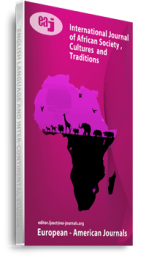African societies present complex cultural mosaics in which knowledge, values and social norms are often channelled through female cultural interactions. In Eswatini, the last absolute monarchy in Africa, younger generations of girls confront a living cultural architecture that includes Umhlanga/Reed Dance, kinship obligations, systemic conformity. At the same time, they experience rapid modernising influences through education, urbanisation, religion, globalisation, and digital cultures. This paper examines how young Swazi girls negotiate intersecting gendered cultural pressures, and how they embody, adapt, resist, or integrate elements of tradition and modernity when constructing identity and aspirations. Using a qualitative, secondary-data case-study approach, this study examines scholarly literature, policy documents and reports, historical analyses, media reportage, and cultural critiques to trace continuities and ruptures shaping girls’ lived realities. The analysis draws on intersectionality (Crenshaw), Edward T. Hall’s high-/low-context framing, feminist critiques of ritual and patriarchy, and contemporary literature on digital youth cultures. Findings indicate that young Swazi girls inhabit hybrid cultural spaces: while traditional rituals and kinship structures continue to shape normative expectations and public performances of femininity, digital technologies and educational expansion enable alternative narratives, forms of agency, and new repertoires for self-fashioning. The results highlight tensions, particularly around bodily autonomy, sexual norms, and political visibility, while also underscoring resilience strategies that rework traditions from within. The paper contributes to African feminist scholarship by centring youth agency in cultural negotiation and by showing how digital modernity complicates Hall’s communicative binaries in contexts of strong customary continuity. The paper articulates policy implications that include culturally informed gender-sensitive education, youth digital literacy, and rights-based engagement with traditional institutions.
Keywords: Eswatini Umhlanga, Gender and culture, digital cultures, identity negotiation., intersectionality, tradition and modernity

